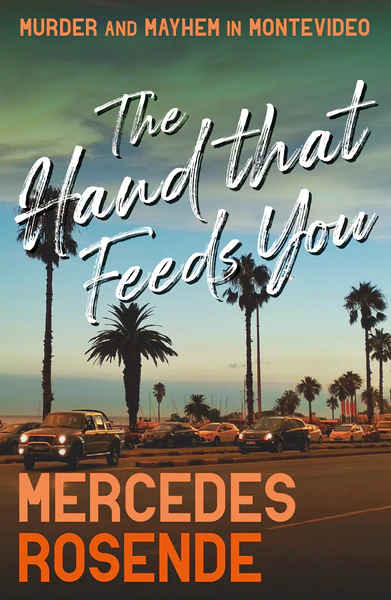
‘The Hand That Feeds You’: An Unsparing Portrait of Montevideo
08 August, 2023The Hand That Feeds You (Bitter Lemon Press, 2023) by Uruguayan author Mercedes Rosende
is a novel about ruins.
Ruins of people, ruins of places, and the ruins of a genre. The Hand that Feeds You is a heist
thriller, a type of crime fiction so familiar to audiences worldwide that it has become a narrative
rundown and overburdened by its own tropes. Yet ruins, like old memories, as one character late
in Rosende’s novel observes, have a persistence to them, as if acting as a reminder that the past
were not altogether past. They are the remains of a past that has not and will not die.
The Hand That Feeds You is a deft and surprising novel that takes the conventions of the heist
thriller and subverts them at every turn.
The book is the second of a series centred on the character Úrsula López, a middle-aged
Uruguayan translator turned bandit who prior to the events of the story would only leave her
home to buy groceries and attend a regular weightwatchers meeting in her neighbourhood. The
first book in the series, Crocodile Tears (Bitter Lemon Press, 2021), sets up the heist: a group of
corrupt officials and ex-convicts plan to rob an armoured truck while it passes through downtown
Montevideo.
The robbery goes awry and Úrsula becomes embroiled in its aftermath, taking advantage of the
chaos to steal the money from the truck for herself. This is the moment in which The Hand That
Feeds You begins as a direct sequel to Crocodile Tears.
Úrsula flees, but is pursued by the corrupt lawyer Antinucci, who serves as the novel’s principal
antagonist and one of the organisers of the heist. Described as a man whose smile appears as a
horizontal grimace, he is a religious zealot who is willing to kill without hesitation but will
immediately consider the need to go to confession if he takes the Lord’s name in vain while
driving through Montevideo’s twisting streets. His ruthlessness and relentless drive to recover
the money from the ambush lends the story with an urgency that intensifies the book’s cinematic
pacing by confronting Úrsula with such a brutal adversary. Antinucci is a two-dimensional
villain, the blatant contradiction between his faith and his actions being his most evident
character trait throughout the novel. However, his moral hypocrisy and cruelty elevate the stakes
of the book and he serves as an appropriate foil to Úrsula.
The other characters are more nuanced and complex, often subverting the clichés of traditional
crime fiction and the detective genre. There is the private investigator whose name constantly
leads her clients to believe she is man, the sociopathic member of the heist crew from Crocodile
Tears who spends most of the novel trapped in a coma, and the police officer, Captain Leonilda
Lima, whose long list of failures she is unable to reverse.
Tim Gutteridge’s translation is excellent, capturing the fine edge of Rosende’s humor in her
writing and the succinct, cutting nature of her descriptions. His translation conserves the
subtleties of Uruguayan rioplatense Spanish as well as its bluntness and brutality, encapsulated in
one of the most beautiful chapters of the book composed entirely of questions that the narrator
poses as a means to attack and probe Úrsula, acting as her conscience and forcing her to return to
a past she desperately wishes to leave behind.
With phrases in Spanish that have no direct translation in English, such as the original title of the
novel, Qué ganas de no verte nunca más which roughly means “How I long to never see you
again”, Gutteridge remains faithful to the hardboiled tone of Rosende’s writing by opting for
another phrase from the novel: Don’t bite the hand that feeds you. With these choices, he
effectively reproduces Rosende’s tone and style as she describes the hole-in-the-wall cafes, the
grimy streets, and the decaying plazas of Uruguay’s capital that act as the setting for the novel’s
plot.
In this manner, The Hand That Feeds You is also a touching and unsparing portrait of
Montevideo as a city that insists on its own exceptionality; the capital of a country that often
projects itself as a nation untroubled by the crime and corruption of its neighbors. Mercedes
Rosende punctures that illusion both explicitly in the book’s conclusion and implicitly in its
story. Those figures of authority who are supposedly in charge of maintaining the country’s
prosperity and peace – the lawyers and police commissioners of the narrative – are its villains.
Úrsula, while heroic in her own right, does not punish them nor bring them to justice. That is
someone else’s job. Úrsula seeks to do what is right for her. While struggling with the ruins of
her own past, she moves forward.
Ruins, even when destroyed, paved over, or transformed into a shopping mall, are not so easy to
forget. Sometimes the past can be so heavy, so pervasive and so all-encompassing it makes it
impossible to imagine a future that could be different, whether in a person’s life or in a literary
genre.
Rosende’s novel shows that even though time does not heal all things, ruins can be a site for the
reimagination of a future that acknowledges and honours the past, but does not repeat it.
Follow Sounds and Colours: Facebook / Twitter / Instagram / Mixcloud / Soundcloud / Bandcamp
Subscribe to the Sounds and Colours Newsletter for regular updates, news and competitions bringing the best of Latin American culture direct to your Inbox.

